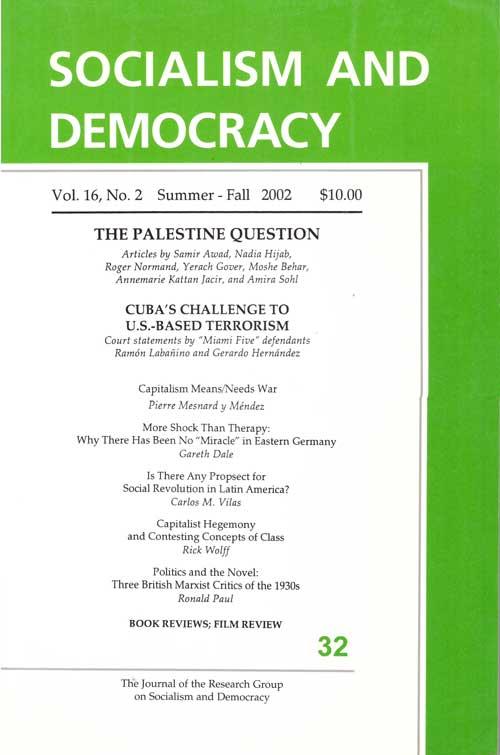[Editorial introduction: In December 2001/January 2002, five Cubans who had been doing undercover investigative work within the Miami exile community, aimed at protecting their country against Miami-based terrorist attacks (such as the bombings carried out in recent years at tourist hotels in Cuba), were sentenced to long prison terms in the United States. They had been convicted of espionage and, in one case, of "first-degree murder" the latter referring to the deaths of four members of the exile organization Brothers to the Rescue whose planes were shot down in the course of hostile flights into or near Cuban airspace (carried out in defiance of clear warnings from the Cuban government) on February 24, 1996.
The trial of the "Miami Five"-Gerardo Hernández, René González Sehwerert, Fernando González Llort, Ramón Labañino, and Antonio Guerrero-received sparse coverage nationally in the U.S. media. It was, however, an intensely political event. High-ranking retired U.S. military officers (from Army, Navy, Marines, and Air Force) testified to the purely defensive character of the Cubans' information-gathering and to the total absence of any military threat to the U.S. from Cuba. The security-related justification for the defendants' investigative work was buttressed by extensive evidence on the long history of terrorist activity engaged in by Cuban exiles.
But the trial took place in Miami, in an environment in which, in the words of El Nuevo Herald (12/2/00), "The fear of a violent reaction on the part of the Cuban exile community if a jury decides to acquit the five men has led many potential candidates to ask the judge to excuse them from civic duty." For 17 months pending trial, and for another 7 weeks while the trial was going on, the Five were held in solitary confinement. Not only was this illegal (since it was unrelated to their conduct in prison); it also severely hampered the preparation of their defense. With an implacably hostile judge, the true nature and purpose of the defendants' undercover work was not allowed into consideration, and they were made scapegoats for the savage fury of the right-wing exiles.
Their case takes on added significance in the context of debates over the 9/11 attacks on the United States. With all that Americans have heard from Washington about “terrorist base-camps” (real or alleged), we are perhaps now in a better position to visualize the role that Florida-based exile operations have long played in relation to Cuba. Washington’s unacknowledged suborning of their terrorist acts was stressed by Fidel Castro in the course of his post-9/11 plea for even-handedness in any global anti-terrorist campaign (see his 9/22 speech, in Monthly Review, November 2001). The same theme reappears along with revealing observations about the FBI’s indulgence of terrorists in the eloquent statements made by the Miami Five in court, on the occasion of their sentencing. [We publish Labañino’s statement in full, and an excerpt from that of Hernández. V.W.]
Note -- Thanks to Peter Roman for alerting us to this material and for obtaining valuable supplementary information. Especially useful was Ricardo Alarcón’s Introduction to With Honor, Courage and Pride: Defense Statements at the Sentencing Hearings of the Five Cuban Patriots Unjustly Condemned by a Miami Federal Court (Havana: Cuban Council of State, 2002).
-- The Five have begun serving their sentences (Labañino’s is for life plus 18 years; Hernández’s, for double life plus 15 years), but their appeals are pending before a federal court in Atlanta. For updates, contact: Free the Five Committee, 39 W. 14th St. (#206), New York, NY 10011; 212-633-6646; www.iacenter.org. Ed. note: See photo in Granma Internacional, May 3, 2002.

